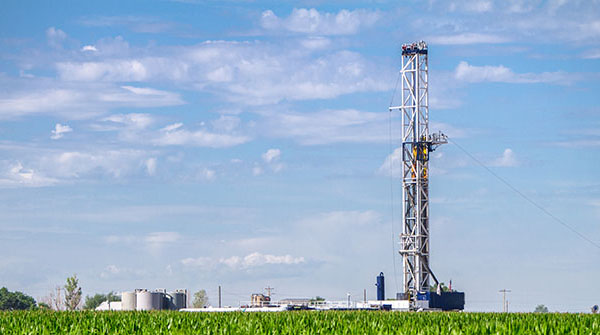S&P Global Offerings
Featured Topics
Featured Products
Events
S&P Global Offerings
Featured Topics
Featured Products
Events
S&P Global Offerings
Featured Topics
Featured Products
Events
Banking & Capital Markets
Economy & Finance
Energy Transition & Sustainability
Technology & Innovation
Podcasts & Newsletters
Banking & Capital Markets
Economy & Finance
Energy Transition & Sustainability
Technology & Innovation
Podcasts & Newsletters
S&P Global Offerings
Featured Topics
Featured Products
Events
14 Sep, 2021

|
A growing number of natural gas producers have committed to certifying that their production meets methane emissions limits and other ESG standards in 2021. Source: grandriver via Getty Images |
Responsibly sourced natural gas is gaining support among shale producers, although it could be some time before a mature market develops for certified gas supply, according to panelists at the LDC Gas Forums' Mid-Continent Forum.
Voluntary frameworks for certifying responsibly sourced gas have only developed in recent years, but 2021 has seen a surge in commitments from upstream companies to certify their production, the panelists said. Under pressure to decarbonize, gas utilities are taking notice, while stakeholders are planting the seeds for trading in responsibly sourced gas and its environmental attributes.
Gas that is certified as responsibly sourced meets certain emission intensity thresholds and other environmental, social, and governance standards.
"We really see it as an opportunity for responsible producers to credibly demonstrate their ESG performance and get an added value in the marketplace for doing that," Equitable Origin Inc. CEO Soledad Mills said during the Sept. 13 panel in Chicago.
Momentum gathers in 2021
Equitable Origin first published a standard for oil and natural gas production projects in 2012, followed by a supplement for shale output in 2015, Mills said. The company began working with Canadian Montney shale producer Seven Generations in 2017 to implement the standard at an Alberta site, which achieved certification in 2019. Seven Generations — which has since merged with ARC Resources Ltd. — entered a deal to sell certified gas to Quebec gas utility operator Énergir Inc. in February 2020.
Equitable Origin now has in the certification process about 10 Bcf of gas production from 18 U.S. and Canadian producers. The company is partnering with buyers, brokers and strategic partners to stimulate demand for responsibly sourced gas and to develop a marketplace where producers can sell certified output at a premium. The company is also training and qualifying independent firms to conduct assessments at production sites.
Equinor ASA decided this year to pursue certifications through Equitable Origin and Project Canary Inc.'s TrustWell framework for Ohio operated production, said Hugh Gleason, principal originator for Equinor Natural Gas LLC. Equinor has since announced that it will relinquish its operatorship in the Utica Basin, but Gleason said the company plans to maintain partnerships with companies pursuing certification, such as Southwestern Energy Co. and Chesapeake Energy Corp.
Southwestern in June announced it would certify and monitor basin-wide emissions in Appalachia through TrustWell certification. The following month, Chesapeake announced it would certify its Haynesville and Marcellus production in partnership with Equitable Origin and MiQ, a not-for-profit partnership between Rocky Mountain Institute and SYSTEMIQ. In the last week, National Fuel Gas Co. announced it would pursue certification throughout its Appalachia footprint, and Exxon Mobil Corp. said it would start with certification in its Poker Lake, N.M., operations in the Permian Basin.
Utilities have been among the early purchasers of certified gas. New Jersey Natural Gas Co. purchased an undisclosed volume from Southwestern in September 2018, marking the first public transaction for responsible gas supplies certified by Independent Energy Standards Corp., which merged with Project Canary in August 2020.
In 2020, Énergir purchased 15% of its system gas through its responsibly sourced gas initiative, and it expected purchases to exceed 20% this year, according to Vincent Regnault, director of gas supply and development of renewable gases at Énergir. Regnault said Énergir did not face much pushback over the cost premium from its regulator, but he acknowledged that it can be challenging to procure gas at anything but the lowest cost in some jurisdictions.
Developing the market
Asked whether the premium for responsibly sourced gas could eventually disappear if most gas is certified, Gleason said this will largely depend on demand. While a surge in demand could push up the premium, the market potential remains unclear, and upstream and midstream producers are largely driving the certification push, he said.
Mark Callahan, editorial director of gas and power pricing at S&P Global Platts, agreed with this assessment.
"In engagement that we have done, largely we've seen that the producers are ahead of the game — a bit more educated than the end-users at this point in time," Callahan said. "Combined with the fact that this is a voluntary market, and you don't have a lot of public utility commissions that have given the approval for end-users to go out and pay this premium, those are just a few factors why I think this is going to take time."
S&P Global Platts is developing a framework for a certificate for responsibly sourced gas attributes that can be traded separately from the underlying commodity, Callahan noted. The certificate would be based chiefly on methane intensity and would benchmark production against measured emissions of peer output.
In the near term, the premium could be a boon to the development of responsibly sourced gas, according to Bob Shults, head of North American markets for Xpansiv CBL Holding Group, which operates a spot market for ESG commodities and has partnered with Platts on the certificate.
"I certainly hope that there is some sort of premium to begin this marketplace in order to encourage producers to do the right thing and to start making some economic decisions that can improve their methane intensity," Shults said.
S&P Global Market Intelligence and S&P Global Platts are owned by S&P Global Inc.
